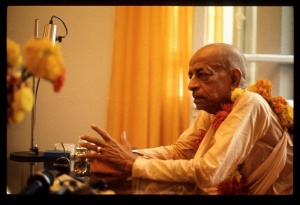SB 1.2.20

A.C. Bhaktivedanta Swami Prabhupada
TEXT 20
evaṁ prasanna-manaso
bhagavad-bhakti-yogataḥ
bhagavat-tattva-vijñānaṁ
mukta-saṅgasya jāyate
SYNONYMS
evam—thus; prasanna—enlivened; manasaḥ—of the mind; bhagavat-bhakti—the devotional service of the Lord; yogataḥ—by contact of; bhagavat—regarding the Personality of Godhead; tattva—knowledge; vijñānam—scientific; mukta—liberated; saṅgasya—of the association; jāyate—becomes effective.
TRANSLATION
Thus established in the mode of unalloyed goodness, the man whose mind has been enlivened by contact with devotional service to the Lord gains positive scientific knowledge of the Personality of Godhead in the stage of liberation from all material association.
PURPORT
In the Bhagavad-gītā (BG 7.3) it is said that out of many thousands of ordinary men, one fortunate man endeavors for perfection in life. Mostly men are conducted by the modes of passion and ignorance, and thus they are engaged always in lust, desire, hankerings, ignorance and sleep. Out of many such manlike animals, there is actually a man who knows the responsibility of human life and thus tries to make life perfect by following the prescribed duties. And out of many thousands of such persons who have thus attained success in human life, one may know scientifically about the Personality of Godhead Śrī Kṛṣṇa. In the same Bhagavad-gītā (BG 18.55) it is also said that scientific knowledge of Śrī Kṛṣṇa is understood only by the process of devotional service (bhakti-yoga).
The very same thing is confirmed herein in the above words. No ordinary man, or even one who has attained success in human life, can know scientifically or perfectly the Personality of Godhead. Perfection of human life is attained when one can understand that he is not the product of matter but is in fact spirit. And as soon as one understands that he has nothing to do with matter, he at once ceases his material hankerings and becomes enlivened as a spiritual being. This attainment of success is possible when one is above the modes of passion and ignorance, or, in other words, when one is actually a brāhmaṇa by qualification. A brāhmaṇa is the symbol of sattva-guṇa, or the mode of goodness. And others, who are not in the mode of goodness, are either kṣatriyas, vaiśyas, śūdras or less than the śūdras. The brahminical stage is the highest stage of human life because of its good qualities. So one cannot be a devotee unless one at least qualifies as a brāhmaṇa. The devotee is already a brāhmaṇa by action. But that is not the end of it. As referred to above, such a brāhmaṇa has to become a Vaiṣṇava in fact to be actually in the transcendental stage. A pure Vaiṣṇava is a liberated soul and is transcendental even to the position of a brāhmaṇa. In the material stage even a brāhmaṇa is also a conditioned soul because although in the brahminical stage the conception of Brahman or transcendence is realized, scientific knowledge of the Supreme Lord is lacking. One has to surpass the brahminical stage and reach the vasudeva stage to understand the Personality of Godhead Kṛṣṇa. The science of the Personality of Godhead is the subject matter for study by the postgraduate students in the spiritual line. Foolish men, or men with a poor fund of knowledge, do not understand the Supreme Lord, and they interpret Kṛṣṇa according to their respective whims. The fact is, however, that one cannot understand the science of the Personality of Godhead unless one is freed from the contamination of the material modes, even up to the stage of a brāhmaṇa. When a qualified brāhmaṇa factually becomes a Vaiṣṇava, in the enlivened state of liberation he can know what is actually the Personality of Godhead.